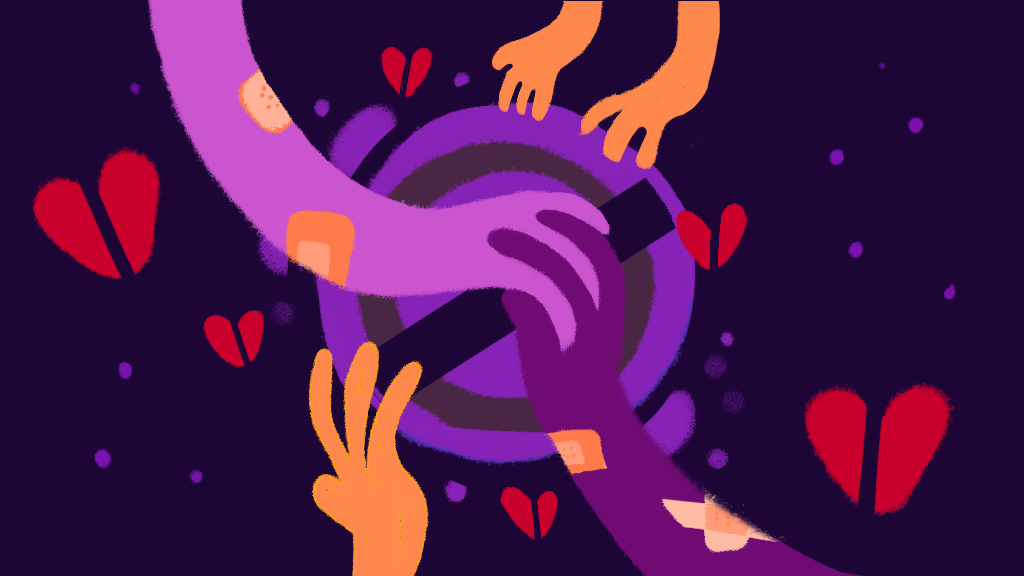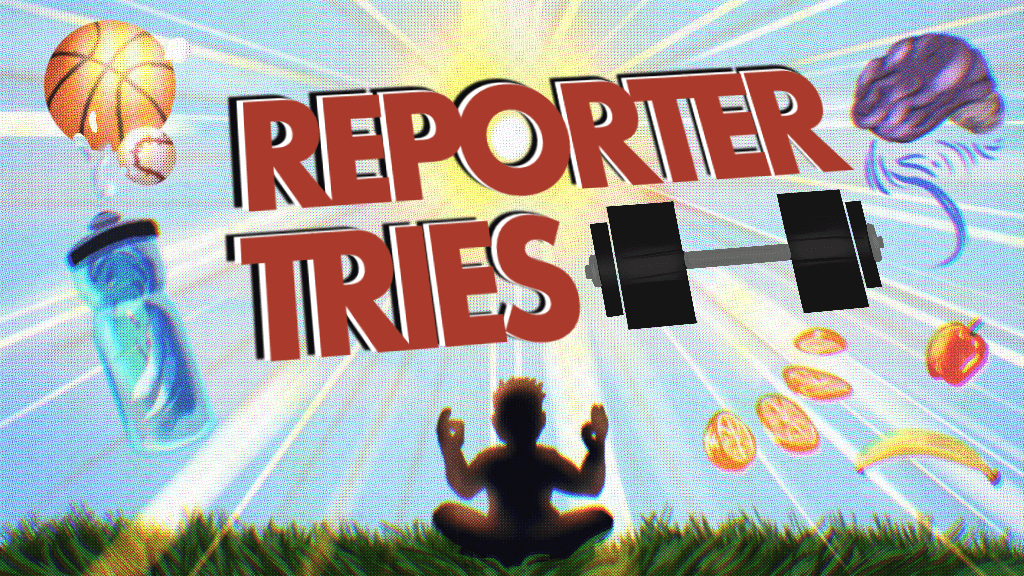Breakups can be messy. Both parties are often devastated and the recovery period can take months or even years. How do we avoid the cycle of pain and breakup with someone in a healthy way?
Whether your needs aren’t met or you simply want to be single, there are a lot of reasons for breaking up with someone. However, getting out of a relationship can be incredibly difficult, especially if you’ve cared for the person for a long time.
Kelly Kamish is a coach for the Sex and Healthy Relationship Committee at the Center for Women and Gender (CWaG). According to her, there are a few things to consider in your approach when breaking up with someone. They include: how deeply you care for them, whether or not you wish to be friends with the person after and how you’re going to ensure your personal safety when exiting the relationship. These factors will all affect your approach to the breakup.
Be Considerate
Try and be as considerate as you can when breaking up with someone. Assuming you both care for each other, it’s an uncomfortable situation and no one wants to go through it.
Dr. William Premo, an adjunct professor for Psychology, has been counseling couples as a psychotherapist for 20 years.
“[You should] explain what isn’t working and why you’re leaving. [Explain] what did work, what you enjoyed and what you learned by being in a relationship with that person,” Premo said.
Honesty is important. You don’t want to lie and say cliche lines such as “it’s not you, it’s me.”
“Being thoughtful is important,” Kamish said. “Frame things in a way that isn’t blaming the other person … Take shared ownership as to why the relationship is ending.”
“Take shared ownership as to why the relationship is ending.”
There’s a reason that the word ‘couple’ refers to two people in a romantic relationship. You were part of this relationship too; the fault isn’t completely on the other person. Relationships are a two way street and taking ownership for your misgivings is a big deal.
Stacy DeRooy, director of Title IX and Clery Compliance, suggests clarity in a breakup.
“Clear and direct communication, in person, without providing false hope is best,” DeRooy explained.
You should also have a plan going in. Consider the possible outcomes; it’s likely you know this individual better than most and you might be able to anticipate their response. In breakups, it’s common to tell the person everything you hated about the relationship and about them. To avoid strong negative outcomes, you’ll have to go into the breakup letting things go; you can’t destroy the person.
Staying Friends
Being friends with your ex can seem impossible, but it isn’t.
“Lots of people [remain friends], even after marriage,” Premo explained. “ … They can continue to remain friends because they see value in the other person as a friend rather than an intimate partner.”
Kamish agreed to a degree.
“It depends on how serious the relationship was,” Kamish explained. “You might not want to lose someone you’ve been with for a long time. Also, if you dated for two weeks it’s easy to go back to being friends … It depends how willing they are to work through the awkwardness and discomfort.”
Furthermore, she explained that it’s very hard to continue being friends with a partner who cheated. Also, some people just have that boundary — they don’t want to be friends with someone they’ve dated. If you’re aware of this fact, it might make it harder to breakup with the individual in the first place.
If you’re looking to continue a friendship after a breakup, there are some things you should consider. First of all, you need to be clear about wanting this friendship when breaking up with them. If you tell them later that you want to uphold a friendship, they may see this as you missing them and potentially wanting to rekindle things. It also might be healthy for the two of you to spend some time apart initially. It can be difficult, for one or both of you, to be around one another while the breakup is still fresh in the mind. It may exaggerate the emotional pain from the breakup and make things more painful for both of you.
Once the two of you are actively friends, make sure boundaries are clear and unbroken. You don’t want to do anything that suggests there may be romantic feelings that promise a future. Also, make sure that you aren’t putting yourself in a scenario that could lead to romantic things. Don’t drink with them, don’t spend time in their bedroom alone, don’t flirt with them and don’t doubt your breakup. Lastly, you need to be prepared for the future. They will find someone else, or you will; that can cause a major dynamic shift in your friendship. Make sure that your friendship with them is genuine and that you would want to hang around them regardless of who they go to bed with at night.
Self-Care
Yes, you want to make this breakup as easy as possible on the person you care about, but you are your own priority. When something emotionally difficult happens, you are of greatest importance. Just because you are the one breaking up with the other person, doesn’t mean you’re not hurt or upset about the breakup.
DeRooy suggested that to self-care you should stay involved with what you normally do. You should also spend time exercising, eating right, self-caring and reaching out to friends.
“A breakup is a loss,” said Kamish. “It’s okay to grieve; take care of yourself.”
Don’t be hard on yourself; what’s done is done and you can’t change it. The best you can do is move forward and learn from the past. There are a lot of lessons in relationships, which is one positive outcome that came from what may have been a negative experience. You learn a lot about yourself as well as how others react to who you are. Going forward, you can adjust your actions and your reactions to circumvent arguments. You can also address your weaknesses and strengthen those before you get into another relationship.
For example, if you know supporting others emotionally is not your strong suit, practice. Try to get more involved with your friends and give them advice when they need it. If you don’t have any good advice to give, turn them to the Counseling and Psychological Services (CaPS) or another friend that may have good advice regarding the situation.
In between relationships, just focus on yourself and be who you want to be.
“Being your own person is very healthy,” Kamish said. “If a breakup happens, you still have yourself.”
“If a breakup happens, you still have yourself.”
Kamish also mentioned that in order to be your own person you have to be a “whole” person. You aren’t looking for your other half, or for someone to complete you.
Maintaining Independence
It’s easy to become dependent on your significant other. However, in the long run, this makes breaking up with them even harder. You’ve spent so much of your time and energy with them that there isn’t a whole lot of “just you” left.
“Dependency usually happens gradually, look for signs. Be deliberate about maintaining independence,” DeRooy said.
Kamish explained that there are four big boundaries you need to set with your significant other while in the relationship.
- Physical boundaries: how much physical space does your partner take up? Do they leave their toothbrush at your place? Do they stay the night?
- Emotional boundaries: how much emotional support are you expecting versus how much you can or are willing to give?
- Time boundaries: how much time you are you willing to give versus how much time you want them to give you?
- Digital boundaries: this would be referencing your relationship’s social media presence, sharing passwords with one another (which is never a good idea), sending explicit photos to each other, etc.
“Clearly articulate where your boundaries are. If you stick to your boundaries, it’s easier to keep your independence,” Kamish said.
The time boundary is particularly important for college students. The level of intensity and how quickly you get there can be a big red flag. It’s easy to fall into a pattern if you live so close to one another. You ignore spending time with your friends and ignore taking time for yourself. In adult life, lovers don’t see each other every day.
“Always have (even if you’re married) 20 percent of your time separate [from your partner] to do your own thing. Some couples do everything together, but there’s no growth of individuality there,” Premo explained. “You also don’t want to have more than 40 percent of your time away from the person because then you’re too independent.”
Kamish insisted you hold someone accountable if they cross your boundaries — consent is non-negotiable. You also might not know all of these boundaries right away. You can always figure it out as you go along; these boundaries are not concrete and are capable of changing.
Staying Safe and Support Options
If you’re in an abusive relationship, most of the tips and tricks mentioned previously won’t be of use to you. Abuse includes: emotional, verbal, sexual, physical, neglectful, cultural, economical and psychological abuse. While the effect of each type is similar, none of them are okay. How do you get out of an abusive relationship? Is it possible to not involve others?
“[The breakup is] the most dangerous time in a relationship. Having a plan in place is so important. Make sure you tell someone you trust that you’re about to break up with the person,” DeRooy said.
Clear and direct word choice is immensely important. If you don’t want to talk to that person again, tell them that.
“Removing the person from your contacts and blocking them on social media sends a message,” DeRooy said. “That’s a clear line you’ve drawn. If they cross that line then let Title IX know, or Public Safety if there is an immediate threat on campus. Call 911 if it’s off campus.”
Kamish emphasized timing. When is it safe to get out? How do you position yourself so you’re safe?
“If you don’t know how they’re going to react, or you think they might respond in anger, [breaking up in] public might be best,” Kamish explained. “Text, call, or Skype if it’s unsafe to do it in person.”
Kamish said that one in three young people are in an unhealthy relationship. Kamish assures that there is support to help you get out of an unhealthy relationship.
It’s vital to educate yourself on relationship red flags. During October, domestic and dating violence month, CWaG puts out red flags and lawn signs with some common red flags written on them. These are placed near the Student Alumni Union. There is also a movement called One Love that educates students on relationship red flags. This movement helps people open their eyes to analyze their relationships, as well as their friends.
“Thank U, Next” is a workshop activity run by CWaG. This workshop is available to any club or organization through an email request to CWaG. Its purpose is to help people get through breakups in a healthy way. Two participants simulate a breakup scenario and the audience gives feedback on how the two participants handled the “breakup”. All of the scenarios are RIT-relevant and based on real life scenarios.
Breakups are incredibly hard. There are many ways to deal with them and there isn’t a “one-size-fits-all” solution. There’s a variety of ways to handle this and you aren’t alone in dealing with it. Breakups are difficult and if you ask someone for help, they’ll usually be willing to give it. Everyone has been there at some point, so don’t be afraid to simply ask.







